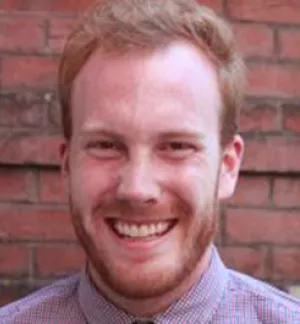MEI has supported the annual Winter Field Study Course, offered jointly by HKS and the Harvard T.H. Chan School of Public Health and led by Professor Claude Bruderlein and his team at the Harvard Humanitarian Initiative’s Advanced Training Program in Humanitarian Action (HHI-ATHA), since 2014, bringing 77 students to the region to grapple with some of the toughest public policy challenges faced by the region and the international humanitarian community from an on-the-ground perspective.
In May 2017, a memorandum signed by representatives of Russia, Iran, and Turkey in Astana, Kazakhstan established four de-escalation zones (DEZs) in Syria, along the existing frontlines between remaining rebel strongholds and government forces backed by Russia and Iran. By November 2017 the fourth and final de-escalation zone in Southern Syria was set into force, in a special agreement between Russia, the United States, and Jordan. In January 2018, 14 Harvard and Tu s Fletcher School students joined MEI Faculty Affiliate Claude Bruderlein and his team in Jordan. Their goal: to develop “ e Amman Guidelines” on humanitarian action in these new de-escalation zones. Bruderlein’s ultimate goal: Expose students to the complexities of real-world humanitarian negotiations and empower them to think and act strategically while upholding core humanitarian values of humanity, neutrality, impartiality, and independence.
When Bruderlein arrives in the region, coming from his post as Senior Advisor to the President of the International Committee for the Red Cross (ICRC), he arrives like the students with fresh eyes to the subject matter, leaving preparation and coordination of the course to course instructor Anaide Nahikian and course administrator Sarah Schwartz. This approach is intentional: he wants students to embark on an authentic process of discovery and critical examination of the issue, without relying on his expertise to guide them. e emphasis is not on answers to find, but on questions to ask – so he joins them in the process. From day one, students began to interview key interlocutors to gather information, starting with the United Nations Development Programme (UNDP) country representative in Jordan. e group interviews required coordination of questions and rigorous self-examination of roles and dynamics within the group. For one hour- and-a-half interview, the class could spend up to two additional hours preparing for and debriefing, on top of hours of contextual research on the complex realities of DEZs in Syria.
Often, students prepared for and debriefed interviews on bus rides around Amman – a nerve center for the humanitarian community’s Syria response – to various interlocutors, including the UN High Commissioner for Refugees (UNHCR), UN World Food Programme (WFP), the ICRC, Jordanian Diplomats and Special Forces, USAID’s Disaster Assistance Response Team, Doctor’s Without Borders (MSF), and local refugee legal aid provider Arab Renaissance for Democracy and Development. When not on the road, the Jordanian Ministry of Foreign A airs’ Institute of Diplomacy served as a home base for students, generously providing classroom space for all-day sessions.
Tackling Humanitarian Dilemmas
Students engaged with several thorny issues in the humanitarian response in the context of DEZs, including avoiding diversion of aid and funding of the ‘war economy’, humanitarian engagement with groups branded by certain influential actors as extremist or terrorist groups, the difficulty of maintaining access for aid on both sides of the frontlines of the conflict, and negotiating freedom of movement and combatting forced returns of refugees.
Throughout the course, Bruderlein implored students to employ a strategic framework for parsing the difficult tradeo s that humanitarian negotiators o en face in the eld. As they were developing recommendations, Bruderlein encouraged systematically separating levels of deci- sion-making from diplomatic positions down to eld-level operations and then placing those policy options on a continuum between humanitarian ideals, pragmatic compromises, and outright instrumentalization by warring parties. At the various levels of decision-making, Bruderlein encouraged students not to get stuck in one operating logic, but to “oscillate” along this continuum and map key stakeholders in negotiations to navigate the inherent tensions in delivering aid in complex emergencies.
Impact Beyond Amman
While Professor Bruderlein and his team see the course primarily as a venue for deep learning, they also continued to work with students to spread the valuable knowledge generated during the course to drive impact in the humanitarian community. At the end of the course, students presented their analyses and recommendations to a group of humanitarian professionals they had interviewed during the course and received feedback on their proposals. A er the course, students continued working with the HHI-ATHA team, many in partnership with the Geneva-based Centre of Competence on Humanitarian Negotiation (CCHN) which Bruderlein directs, contributing to an ongoing series of events, discussions, and research that continues to inform humanitarian negotiations around the world, as detailed below.
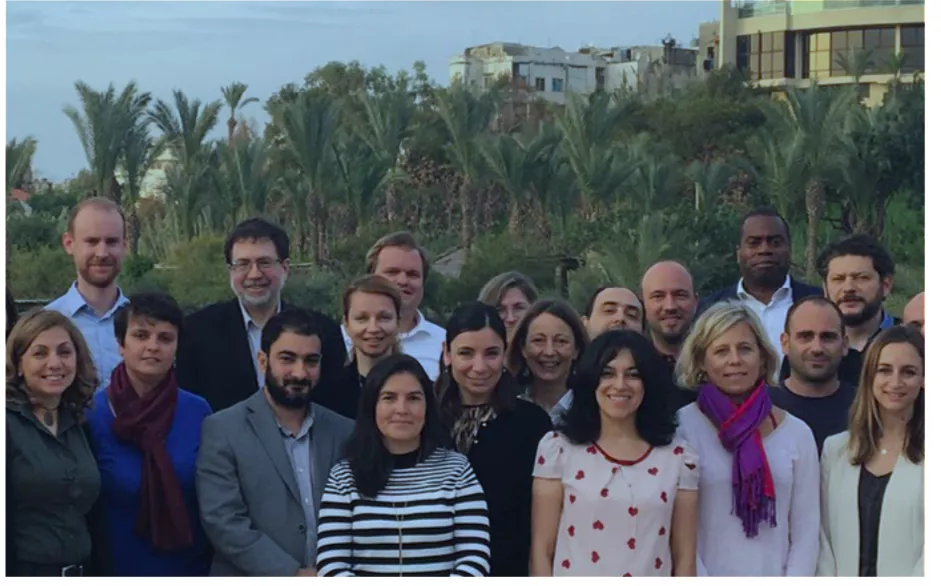
-
26 FEBRUARY-2 MARCH Byblos, Lebanon
Regional Workshop on frontline humanitarian negotiation
HSPH student Abu Abioye joined Prof. Bruderlein in Byblos, Lebanon to facilitate a workshop for frontline humanitarian negotiators in the Middle East, drawing on the lessons and frameworks from the course to inform humanitarian practices on the ground.
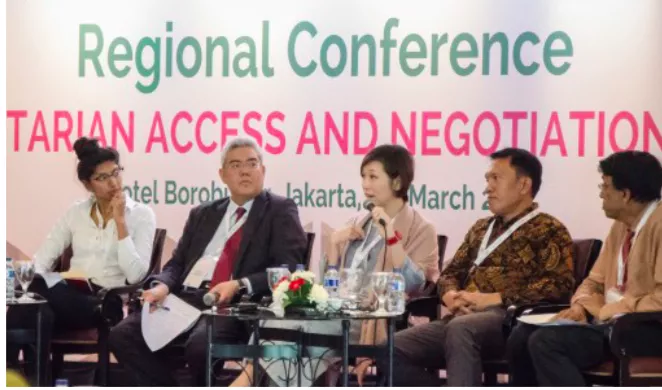
-
8-9 MARCH Jakarta, Indonesia
Regional conference on humanitarian access and negotiation in Asia
HSPH student Sindu Govindapillai, a Global Health Fellow at Boston Children’s Hospital and Laos Friends Hospital for Children, brought the lessons of the course to the unique dilemmas of negotiating for humanitarian access in Asia. She facilitated a panel discussion on this topic at the CCHN’s first Regional Conference on Humanitarian Negotiation in Asia on March 8-9 in Jakarta, Indonesia.
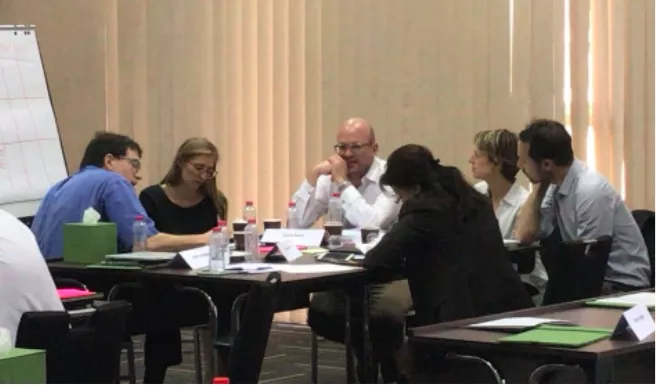
-
12-13 MARCH International Humanitarian City, Dubai, UAE
Regional roundtable on negotiating access to de-escalation zones in Syria
Three students from the course, Aleesha Shaik (HSPH), Gabriel Costa (HKS), and Laura Oller (HBS) joined the HHI-ATHA team in preparing for CCHN’s Regional Roundtable on Humanitarian Access to “De-Escalation Zones” in Syria, held at the International Humanitarian City in Dubai, UAE. The team engaged in the eld research and preparation of background materials that led to an in- depth report on the key dilemmas in providing humanitarian aid and protection in Syria’s DEZs, and recommendations for humanitarian action at the technical, negotiation, and diplomatic levels.
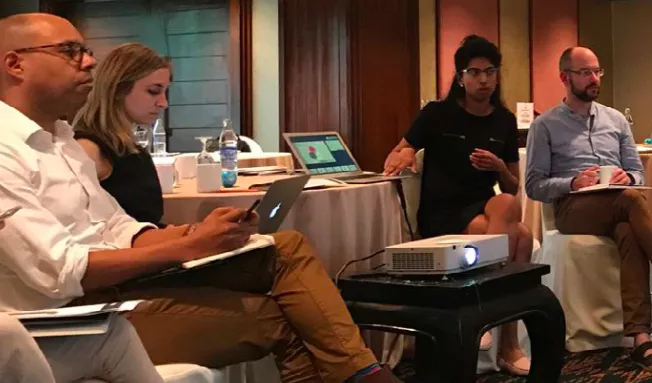
-
23-27 APRIL Bangkok, Thailand
Regional Workshop on frontline humanitarian negotiation
Having led the March panel in Jakarta, Sindu Govindapillai took the output
from the panel to lead a roundtable in CCHN’s Regional Workshop for frontline humanitarian negotiators in Bangkok, Thailand on April 23-27, where participants reflected on how Asia’s unique regional dynamics should be drawn up to inform a culturally-specific understanding of humanitarian negotiation practice in the region.
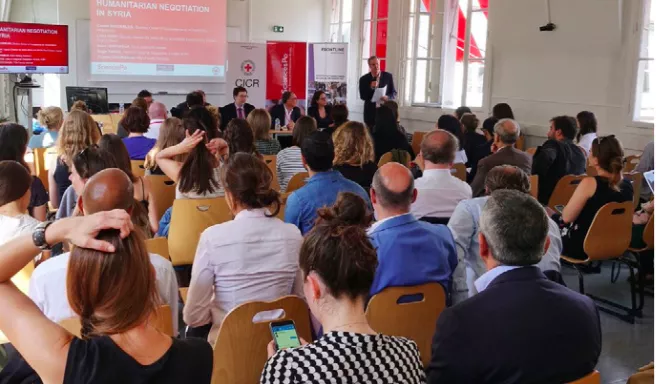
-
23-24 MAY Paris, France
High-level forum on humanitarian negotiation in Syria
HKS student Gabriel Costa conducted background research for a high-level forum held at the Paris School of International A airs, co-facilitated by CCHN, ICRC, and PSIA, which drew frontline negotiators from ICRC, MSF, WFP, UNHCR, and UNICEF to discuss the negotiations strategies pertaining to the presence, access, and programming of humanitarian organizations throughout Syria. Former UN Special Envoy for Syria Lakhdar Brahimi also added his perspective to the forum.
-
SUMMER 2018 Beirut, Lebanon and Amman, Jordan
Research on humanitarian negotiations with non-state armed groups (NSAGs)
Gabriel Costa (HKS) received funding from the Middle East Initiative to continue his research with the HHI-ATHA and CCHN teams, traveling to Beirut and Amman, and virtually to Gaziantep, Turkey and Djibouti, in the summer of 2018 to conduct interviews with various stakeholders on humanitarian negotiations with non-state armed groups (NSAGs) in the Middle East. Costa also continued work with CCHN to turn the background papers he and other students worked on for the Dubai and Paris forums into a chapter in CCHN training materials used in the Middle East and around the world
Read the full 2017-2018 Mosaic
<p>This article appeared in MEI's 2017-2018 Mosaic. The full issue of Mosaic can be found here!</p>
“Negotiating Complex Humanitarian Emergencies in Syria.” Mawhorter, Christopher, ed. December 20, 2018


